- Home
- Roxane Gay
An Untamed State Page 3
An Untamed State Read online
Page 3
“I am the Commander,” he said.
I nodded slowly and before I could stop myself, I said, “Commander of what? Where is your army?”
He crossed the room and grabbed me by my throat, pulling me to my feet. I slapped at his forearms but he tightened his grip. My face grew taut as I struggled to breathe. When he was satisfied with his display of authority, he shoved me back onto the bed. He wiped his hands, spat on the floor. He laughed. “Let’s try this again. I am the Commander. Today, I am the Commander of you.”
“Like hell,” I snapped. I bit my lower lip. I wanted nothing more than to repeat my question but I could still feel his fingers holding my throat closed. The edges of the room were dark and fuzzy.
The Commander sniffed loudly, leaned in real close. “How come you don’t cry? I was certain there would be tears already.”
“I do not waste my tears.”
He began pacing. He pulled his gun from his waistband and waved it toward me. “Your family,” he said. “They will pay a lot of money for you. U.S. dollars.”
I watched his frenetic pattern back and forth across the room. I looked him right in the eye. “My father doesn’t believe in paying kidnappers. You should know that.”
The Commander approached me again. He pressed the gun flat against my chest, slowly dragging it between my breasts. I wondered if he could smell my milk, on the verge of leaking. He licked his lips. “Your father will pay for his youngest daughter. I am to understand you are his favorite.”
The word daughter lay heavy on his tongue, took on a repulsive shape.
I dug my fingernails into my thighs and hoped my father would be a better man than I knew him to be, would ignore his convictions, would pay, and quickly. I hoped I did not know my father as well as I feared.
The Commander sat next to me, our thighs touching. I tried to move away but he grabbed my thigh, his fingers digging into the meat of my body. “I’ve been to Miami,” he said. “A fine city.”
I stared at the terrible scar beneath his eye. I tried to memorize his features, his clothing, his shoes—Skechers. I recognized the logo. These details felt important. I had to go the bathroom very badly but I didn’t want to ask. I did not want to ask my kidnappers for anything.
The Commander tapped my knee with his gun. He repeated himself, said, “I’ve been to Miami.”
I inched away again.
He grabbed my elbow. “Sit still.”
I shrugged. “I’ve been to Miami too.”
I did not want to tell him anything about my life. I did not want to tell him about my home with the silver palm trees in the front yard and small pool in the back where we swam with Christophe, or how on Fridays and Saturdays my husband and I got a babysitter and went to South Beach, where we ate expensive dinners and danced salsa all night, or how some days we were surprised to hear someone speak English, so varied were the tongues of the city. I did not want him to know anything about me.
The Commander grabbed the bone of my chin. He forced me to look at him. His eyes were strangely warm; not even the scar could make his eyes ugly. He said, “Don’t play games. We know everything about you, where you live, where you work, where your husband works.”
I pulled away. “Somehow I doubt that.”
He reached into his pocket and proffered a cell phone. “Call your family.”
My hands shook as I dialed the numbers. The phone rang once, twice, and then I heard my father’s voice. “It’s me,” I said.
The Commander plucked the phone from my hands. He said, “We will not negotiate. We want one million dollars for the beloved daughter of one of Haiti’s favorite sons.”
Whatever my father said amused the Commander greatly because his smile grew wider and wider. He handed me the phone.
I said nothing. I had nothing to say.
“You will have to be strong,” my father said.
I marveled at his ability to state the obvious, to say the most useless things.
“I’d like to speak with my husband,” I said.
There was a pause and then Michael said, “Babe,” and I closed my eyes, imagined sinking into his voice, imagined being safe again.
“Christophe . . .”
“He’s fine. I’m holding him right here.”
I listened as carefully as I could, trying to make out my son’s breathing.
“Are you okay?” Michael asked. “Have they hurt you?”
“I’m fine,” I said. I wanted to be careful and calm. I wanted to say something important, something that would help Michael find me, something he would remember and hold on to. I said, “I’m not that far from you. I am not far at all.” The Commander grabbed me by my hair, yanking hard. I did not make a sound even though my scalp burned. Christophe was listening. I did not want my child to be frightened. Michael shouted my name over and over.
The Commander said, “One million dollars. We will call in two days to make arrangements for payment.” He hung up and released his grip, shoving me to the floor. He waved his men out of the room and just before he locked me in my cage, he wiggled his finger back and forth, said, “You are not as smart as you think you are.”
I was alone again. I had two days and then I would be returned to Michael and Christophe and we could find our way home. I could survive two days with these men. I could.
My parents spent most of their lives trying to find their way home too. They wanted to return to their island, their people, their food; they yearned for the salt of the sea on their skin or at least my father did and my mother learned to want for what he wanted.
It is not easy to be the child of immigrants who, for most of my life, wore a longing for home nakedly. After they were married, my parents headed to the middle of the country because sometimes, to find home, you must first go farther afield. In Nebraska, a landlocked, flat place filled with thick, pale, cheery people, they were alone, far from everything they knew or loved but they were going to be happy. My father does not understand obstacles, doesn’t believe they exist. He cannot even see obstacles. Failure was never going to be an option. He often says, “There is nothing a man cannot get through if he tries hard enough.”
He built skyscrapers. We’d move for a year or two while he oversaw a new project, and come back to Omaha for a year or two, all our lives, all so he could reach higher and higher. My father said, “There’s no telling how high a man can reach if he’s willing to look up into the sky and straight into the sun.” On the day of the ribbon cutting for his first skyscraper, my father stood with my mother, side by side, their bodies practically melded together. He held his arm around her waist, his hand resting possessively against her stomach. My brother and sister and I ran in frantic circles around them, buoyed by the excitement of a tall building and an oversized pair of scissors and our father, wearing his hard hat and a well-tailored suit. My parents stood staring up at the tower of steel and glass gleaming brightly beneath the high sun. My father said, “I told you I would build you a monument to the sky,” and my mother murmured, “Yes, Sebastien, you certainly did.” She once told me there was something very attractive about an ambitious man. I think she confuses ambition and ruthlessness. That night, we went out to dinner after the ceremony and my parents spent most of their time sitting with their foreheads touching in their own world. My parents are not warm people. They love hard and deep but you have to work to understand the exact nature of that love, to see it, to feel it. That day was the first time I realized my parents loved each other more than they loved us though I couldn’t know then the price I would pay for that love.
Even hours after he stalked out, the Commander’s threat lingered, trapped in the thick heat of my cage. I whispered my father’s words. There is nothing I cannot get through if I try hard enough. My chest throbbed, my breasts still swelling, rock hard. Leaking milk spread over the cotton stretched across my chest. I had never planned on breastfeeding Christophe but when I first held him, so soft and mewing, his tiny lips quivering as they sou
ght my breast, I couldn’t help but hold him to my chest; I couldn’t help but give him what he needed. Now, my son was alone with his father, needing me and there was nothing I could do. I gritted my teeth.
Growing up, my father told my siblings and me two things—I demand excellence and never forget you are Haitian first; your ancestors were free because they took control of their fate. When he came home from work each night, he’d find us in our corners of the house and ask, “How were you excellent today?” We needed to have a good answer. If he approved, a rare thing, he smiled, squeezed our shoulders. If he disapproved, he’d remove his glasses and rub his forehead, so wearied by our small failures. He would say, “You can be better. You control your fate.”
His disapproval was constant and quiet and exhausting. Mona and Michel largely ignored my father’s demands but as the youngest, I took him very seriously, made myself sick with the pursuit of perfection, the better he might love me for it. I had near-perfect recall of most everything I ever saw or heard or read—I was just lucky in that way. It wasn’t so difficult to become excellent. My memory drives the people in my life crazy because I remember everything, always, in exacting detail. My memory was a gift until it became a curse, until no matter how hard I tried, I couldn’t forget things I desperately needed to forget so I might survive.
One day, when we were fooling around, my brother and sister and I found a secret world about a mile from where we lived—an undeveloped tract of land with a small creek and lots of trees, all beyond a steep hill. People would go there to throw away their junk so there were always new, interesting things to play with and explore. We called it Pitfall, like the Atari game, and whenever we were done with our homework, we would jump on our bikes and head to a place where we weren’t Haitians in America or Americans in Haiti, where we could make our own rules and draw our own maps. We only wanted to understand some small part of the world.
As I waited for something to happen, I began to draw a mental map of where my kidnappers were holding me, to make sense of this world I wanted no part of. That’s what my father would want—for me to take whatever control I could. Starting at the door, I pressed my hand against the wall and began counting out the number of paces it took to walk the length of each wall—seven steps, ten steps, seven steps, ten steps. I tried to memorize these measurements; I tried to understand the terrifying shape of the walls holding me.
I wasn’t tall enough to look out the window so I overturned the large bucket and stood on it. The window looked onto an alley littered with trash. Occasionally I saw the legs of a passerby. When I banged on the window, no one paid me any mind. “Help me,” I shouted, until my throat hurt. “Please help me.” Sometimes, a pair of legs stopped then quickly walked away.
This was not the Haiti my parents wanted to return to, this land of mad indifference. They remembered the country differently, almost fondly, and the beauty of their island only blossomed the further through time they moved away from it. Like most people, they, or at least my father, created a Haiti that only exists in his imagination—a country that would willingly embrace him.
When I graduated from high school, my parents returned to Port-au-Prince. He had his fill of working seventy hours a week, answering to white men who would never promote him even though he gave them more than twenty years of his life. My father started his own construction company and it soon became the largest, most successful firm in the country. He was the triumphant son, returned. He would reshape the country into the home he remembered, the unvarnished one. It was easy for my father to overlook the country’s painful truths because they did not apply to him, to us. He left the island with nothing and returned with everything—a wife, children, wealth.
There is this truth too. My mother was reluctant to return to Port-au-Prince. The oppressive heat and the promiscuity of the capital, so many people living in such close quarters—it troubled her. She hated how everyone was always preoccupied with everyone else’s lives. It would be different this time, my father assured her. They were together. They had money. My mother resigned herself to my father’s dreams as she has always done.
After she returned to Haiti, I often wanted to ask her why my father’s dreams were more important than her own, but the question would have hurt her more than her answer would have helped me. It wasn’t until I was taken away from my husband and child that I realized we were all going to pay the price for my father’s dreams.
I grew bored staring out the window, being ignored. I sat on the bucket and wondered what time it was. It felt like days had passed since we decided to go to the beach. The air was thick enough to fall into. The walls were slick with moisture. I heard a television and in the distance, a radio, cars speeding past. The music was familiar though I couldn’t quite make it out. My bladder burned. My scalp throbbed. My face felt broken, the various pieces of me loose and coming apart. I crossed my legs tightly, wondered how my captors expected me to relieve myself. I could not handle pissing in a bucket, being forced to stay in that hot room with my own stink. That was what I thought because nothing much had yet been asked of me.
I did not want to ask my kidnappers for anything but I did not want to soil myself. I wouldn’t be able to last much longer so I walked slowly to the door and pulled on it. It was locked. I exhaled slowly, knocked three times, waited. I started dancing from foot to foot. I knocked again, more loudly.
When the door finally opened, a young man, maybe twenty-five, not much younger than I, stood in the doorway. He too had a gun tucked into the waistband of his pants. He smiled, not unkindly.
“I need to use the restroom.”
The man cocked his head to the right and turned. He motioned for me to follow. I walked with small steps, tried to memorize everything I saw. We passed the kitchen, where men still sat with dark glass bottles in front of them. They sneered as I walked by. The same man who leered at me earlier licked his lips slowly. I tried to ignore the line of fear weaving itself into my spine. Already my senses were sharpening. I smelled the danger.
The bathroom was small and unclean. The air was sour. There was a window, small, but I could still fit. I could try. And then I could run and get free, find my way home. A surge of hope flared through my breastbone. As I tried to close the door behind me, my escort stopped the door with the toe of his boot.
“Door stays open.”
My face burned, heat rising up through my neck. “You cannot be serious.”
He ran his fingers along the handle of his gun. I knew I couldn’t hold out much longer. I was desperate. I bit my lower lip. My hands shook as I pushed my jeans and bikini bottoms down my thighs.
We were supposed to go to the beach, Michael, Christophe, and I. We were supposed to be at the beach, bathing beneath the sun while Michael ogled me in my new bikini. The bikini was a gift—black and chic with narrow, pleated folds along the front. He gave it to me the night before we left. I was in bed wearing a pair of his boxers and nothing else, one leg crossed over the other, bouncing my foot, watching him pack. He always packs for us, says I have no sense of how to arrange things in small spaces. Rather than get annoyed with how I pack, mostly by throwing piles of clothing into the suitcase and sorting it out upon arrival, he handles the packing.
When Michael finished with our son’s suitcase, he threw himself on the bed next to me and slowly pulled the bikini out of his pants pocket, first the top then the bottom, dangling them over my face as I grabbed at them, giggling happily. “A beautiful body deserves a beautiful bikini,” he said. We had already been married for five years, but I still blushed. He has always made me feel like the only beautiful woman in the world. I held the top against my chest, admiring the sleek design. I draped the bikini bra around his neck and pulled him toward me, hooking my leg over his, pulling him closer, pulling him into me, my heart pounding, his heart pounding, him on top of me and inside me, both of us quiet but breathing hard and something about the heavy silence of the moment made me feel everything that much more.
<
br /> The man watching over me stared, the left side of his lip rising unattractively. I bit my lip harder, tasted blood, and tried to cover myself with my arms as I hovered over the toilet seat. The pressure between my thighs was unbearable. I tried to relax. I tried to breathe, to give in to the humiliation. I tried to let go but I couldn’t. All I could feel was that man’s eyes on my body, seeing parts of me I only showed my husband. “My husband is going to kill you,” I said. “He is going to tear you apart with his bare hands.” A wave of dizziness rocked me and I grabbed the sink to steady myself. My escort laughed, stepped inside the bathroom, closed the door behind him.
A fresh wave of panic rose inside me and finally I was able to relieve myself. I wiped quickly and flushed and moved to the sink to wash my hands. I stared at my reflection as I ran my hands under the lukewarm water. A bruise was spreading beneath my right eye and there was a thin cut along my forehead. I patted my damp hands over my face and wiped them on my jeans. I held on to the sink. My escort moved behind me. I looked up and studied him in the mirror. I gripped the sink more tightly. Our eyes met in the mirror. I refused to look away. He planted his hands on my shoulders, squeezing hard. He rolled my muscles beneath his fingers. It was not pleasant.
“You should thank me.”
I nodded. I tried to ignore my instincts, tried to think of every possible outcome for anything I might say. I could be smart or I could be stupid; neither alternative would end well. I chose stupid. “I’m not going to thank you for a damn thing let alone taking a piss.” I hoped the coarseness of my words might add some steel to my spine.

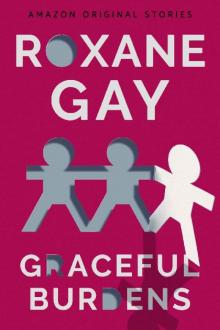 Graceful Burdens (Out of Line collection)
Graceful Burdens (Out of Line collection) The Best American Short Stories 2018
The Best American Short Stories 2018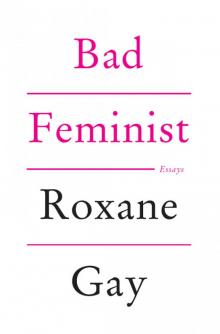 Bad Feminist
Bad Feminist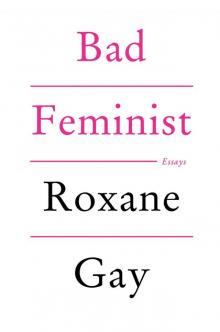 Bad Feminist: Essays
Bad Feminist: Essays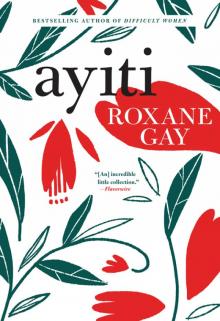 Ayiti
Ayiti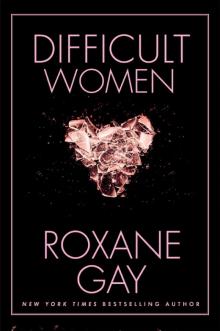 Difficult Women
Difficult Women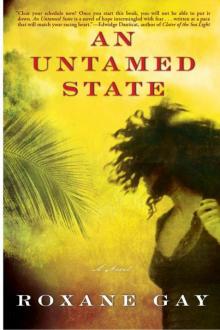 An Untamed State
An Untamed State Hunger
Hunger